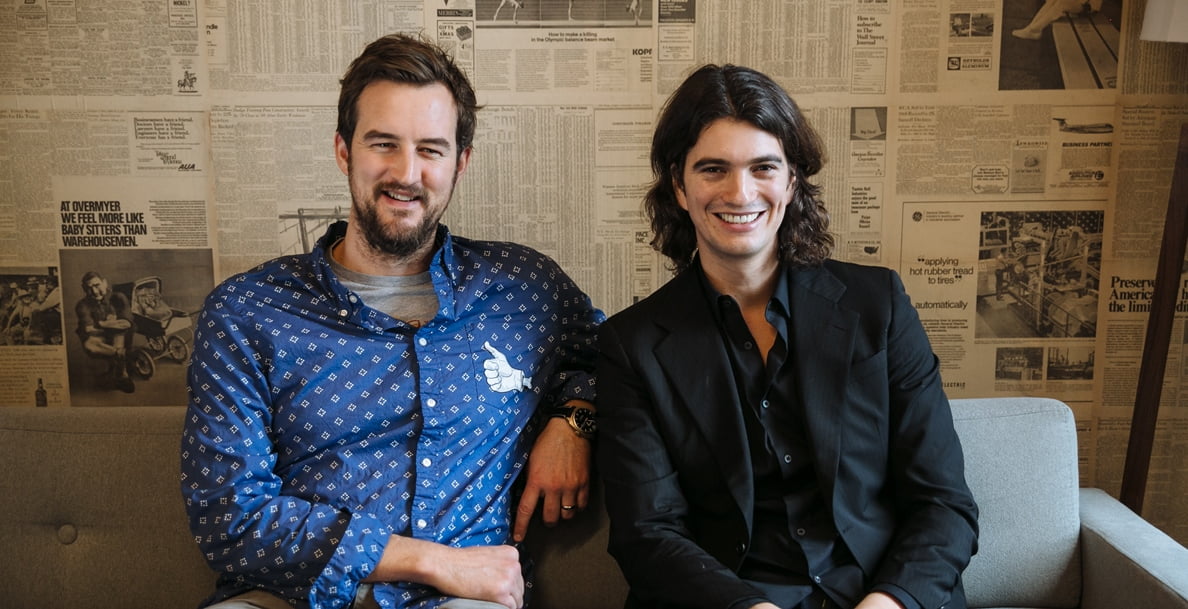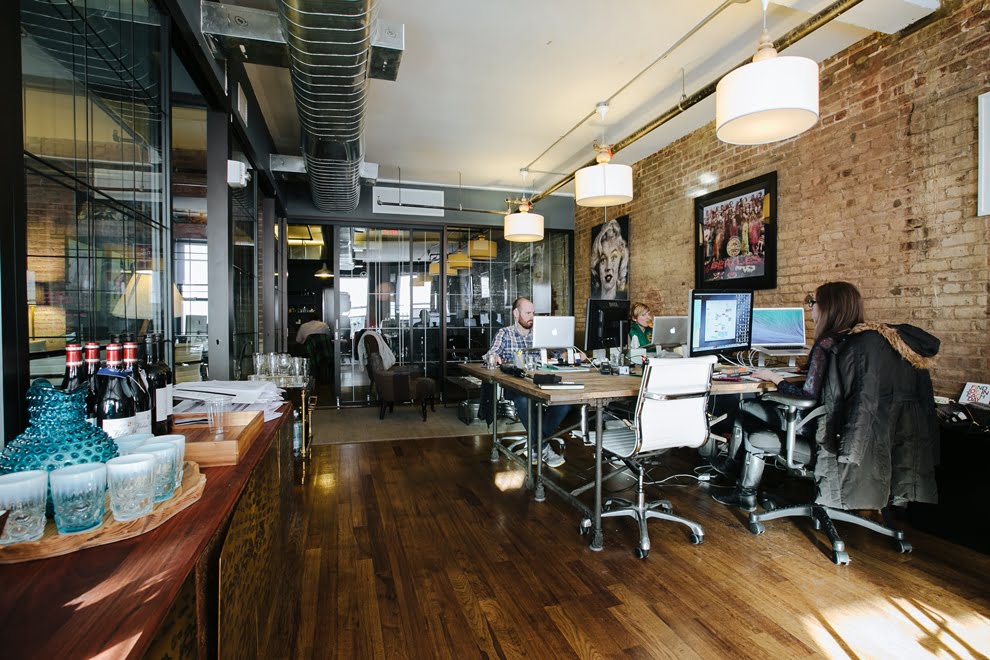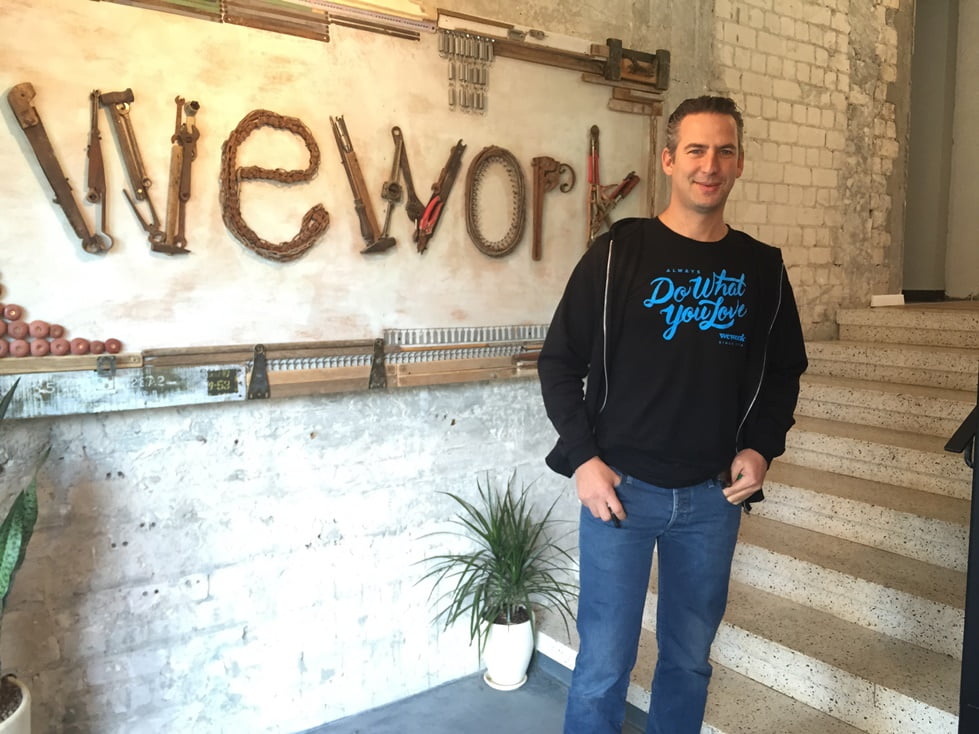When Adam Neumann and Miguel McKelvey started renting out office space through Craigslist in 2008, they didn’t envision that by 2015 they would own a $5 billion empire that is transforming office real estate as we know it.
This year, the two are on a mission to triple the size of their shared working space company, which was founded in New York, and is slated to open new offices in Spain, among other locations.
Six years ago, the duo rented out desks to some startups in an office space in Brooklyn, which filled up within a few days. The young business partners – wunderkind Neumann (34), who grew up on a Kibbutz (a collective community in Israel), and architect McKelvey (41), who spent his childhood in a five-mother collective in Eugene, Oregon – realized that companies were looking for a shared community, rather than just real estate, and recognized the need to revolutionize office space rentals: why rent a whole office when all you really need is a desk or two?
And so in 2010, they established WeWork, now the largest shared office space community in the world. “They realized they were on to something – the world needed a new kind of office because the nature of business was changing,” Benjy Singer, Director of WeWork Israel, tells NoCamels.
Since then, the company has experienced explosive growth, reaching 16,500 members in 32 locations in US cities (New York, San Francisco, Boston, Washington DC, Chicago, Los Angeles, Austin, Seattle and Miami), in Europe (London and Amsterdam) and in Israel (Tel Aviv and Herzliya). This year, the company is expanding in London and Amsterdam. This expansion means hundreds of new startups in any of the super-trendy WeWork offices, sharing everything from dining and rest areas to bar and shower areas.
Neumann, a tall and charismatic nonconformist, tells NoCamels he doesn’t run a traditional real estate company and his clients are community members, not tenants. Roughly 400,000 new businesses are launched every month in the US, many of which are tech startups that are looking for a different kind of office vibe, he says. Singer adds: “In the beginning, these startups can work from a coffee shop, but as business grows, it becomes more serious, and you actually need physical space – with no kids and no pets – or else it’s hard to focus.”
According to Singer, many startup companies have exhausted all alternatives, including startup incubators and accelerators. But what really propels startups to join WeWork is being around other people with whom they can brainstorm and create joint ventures. A recent survey conducted by WeWork found that 57 percent of its members have collaborated with one another; 63 percent of the WeWork businesses said they grew since joining.
Transforming physical space into a community
“90 percent of people can work from anywhere, so if you do go to the office, there should be some added value there,” says Singer, “and that’s what we provide. We have transformed the physical space into a community.”
That added value is also reflected by the design of the WeWork space, which is not just hip or trendy, it also serves a purpose. “The design, the community and the sharing aspects are intertwined,” Singer says. “There are glass walls and partitions with vinyl stickers on the lower part of the glass, so when you sit down you have some privacy. Standing up, you’re looking at everybody. You have to be a complete anti-social person not to interact with others.”
Also, the common areas bring people together to chat. “If you want to eat or get coffee or have a beer – how can you have coffee without having a conversation with whomever is next to you? It’s almost impossible,” Singer says. “Everyone here wants to succeed in business, so they help each other. It happens organically.”
Tamar Schoppik, co-founder of digital content marketing company SHEvooking, agrees. “We like the idea of a community that we can network with,” she tells NoCamels. SHEvooking joined WeWork in Tel Aviv a couple of months ago, after searching for office space elsewhere in the city. “There are a lot of holes-in-the-wall that are called offices,” she tells NoCamels. “Many people turn apartments into office space, but it’s not very nice that your conference room is the dining room.”
The five-floor Tel Aviv office includes 422 desks for 118 companies, and has four kitchens and ten meeting rooms.
“Rebellion against tradition”
Following a recent visit to Israel and the UK, Neumann wrote to WeWork’s community members: “The people I met there spoke different languages, came from divergent cultures, and inhabited very different landscapes, but they shared one great thing in common: they were all consumed by the passion to do what they love.”
Apparently, Neumann appreciates this kind of entrepreneurial environment. Prior to establishing WeWork, he was the co-founder of the co-working firm Green Desk, which helped transform the Dumbo neighborhood in Brooklyn, New York, into a hub for small, creative companies.
Joey Low, founder of New York-based Star Farm Ventures, which has invested millions of dollars in WeWork, tells NoCamels that Neumann’s leadership and vision is what led to his significant investment in the company. “He’s a very impressive, charismatic young man, very engaging,” Low says. “He’s probably the most exciting Israeli businessman around. His mind is racing all the time. His vision – changing how people live and work – is contagious.”
Low, whose investment in WeWork alone tops all of his other investments in startups (such as Taboola and Ringya) combined, compares Neumann to legendary Apple founder Steve Jobs, who was “unbelievable and famously difficult. Adam can remind you of that. He just runs so fast. He has the personality and the vision, but so far he’s also executed.” Low feels he “acted out of character to put so much money into WeWork,” especially after friends had warned him that WeWork’s valuation was too high. “It is still is too high,” Low admits. “Everyone said, ‘don’t do it,’ but I was taken in. I drank the Kool-Aid.”
Sign up for our free weekly newsletter
SubscribeHowever, WeWork is not all about Neumann’s magnetism. “The more you learn about the company, the more you are impressed. People don’t want a traditional office. It’s a rebellion against tradition.”
Neumann declined to comment on WeWork’s valuation or whether it would go for an IPO. However, the young maverick did share with NoCamels his vision for the coming years: “My dream is that 20 years from now, when we talk about how the sharing economy and millennials changed the way people work and live, WeWork will be one of the companies synonymous with this movement and renowned as a catalyst for a meaningful, positive change.”
Asked what inspired him to launch WeWork, Neumann answers: “The kibbutz, Kaballah (Jewish mysticism) and my wife.”
Neumann is married to Rebekah Paltrow Neumann (cousin of actress Gwyneth Paltrow), who serves as chief brand officer at WeWork. Apparently, Neumann can already afford to cash in on WeWork’s success: he reportedly purchased a $10.5 million Greenwich Village townhouse for his family in January 2014, according to The Real Deal.
SEE ALSO: Meet The Winners: Top 15 Israeli Startups And Innovations Of 2014
WeWork, which was initially backed by billionaire real estate mogul Mort Zuckerman of Boston Properties, recently raised $335 million, at a company valuation of nearly $5 billion. This is the company’s second funding round following an angel round in January 2012 in which it raised $6.85 million. In addition, according to reports in the Wall Street Journal, the company plans a public offering within the next two to three years.
However, Neumann stresses that “while there will be talk in the upcoming months of our company’s ‘value,’ we want to be clear that for us, our real value is determined by how many lives we make better,” he recently wrote to members of WeWork. “Our ability to do this is solely based on our members, who are the basis for all the connectivity, collaboration, and inspiration that make us WE and give us the ability to impact the world in a meaningful way.”
In the meantime, WeWork’s co-founders, Neumann and McKelvey, have ambitious expansion plans for 2015: they hope to grow membership to 50,000 by the end of this year, primarily by adding new locations in major cities around the globe. “It’s clear to me that there are many more people all over the world who will soon join our community of creators, and it’s even clearer that our work is just beginning,” Neumann said in a written statement.
Neumann also reportedly plans to launch “WeLive”, presenting the concept of the collective community to the residential sector. WeWork is reportedly redeveloping an office building with adjacent small residential units (300-600 square feet each) and shared common spaces in the Washington DC area, according to the Wall Street Journal. Additional WeLive locations are expected to open in coming years. WeLive will offer affordable housing of sorts, which might appeal to young people in sought-after, expensive cosmopolitan cities like New York and Tel Aviv. Sources close to WeWork told NoCamels that WeLive would feature small residential units; however, the concept is still under the radar.
Cheaper office space, richer collaboration
Meanwhile, WeWork’s offices are almost 100 percent occupied with technology startups, online marketing firms, and a range of other businesses, such as taxi company Uber and dinner party enterprise Eat With. Prices in Tel Aviv range from 700 NIS ($180) per month for a desk in an open space to 2,000 NIS ($511) for a desk in an office. That price includes taxes, utility bills, coffee and even beer. In comparison, on average real estate companies rent out office space for 90 NIS per meter a month in central Tel Aviv, which translates into 4,500 NIS ($1,151) per month for a 50-square-meter office – taxes, utilities and coffee excluded.
“The average office sits on about 20 square meters but at WeWork it is 7 square meters on average,” Singer says. “You never pay for more than you use, which is normally what happens in traditional office space. But we also offer the flexibility of growing your business here. You don’t know what is going to happen with your company six months down the line. Here, you can move to bigger or smaller spaces.”
Singer (48), whose brother Saul co-authored the seminal book ‘Startup Nation’ and coined the prevalent expression that describes modern Israel, moved from New York to Israel when he was 20 years old. Growing up in New York and doing business in Tel Aviv, Singer believes WeWork is beneficial to large cities. “We’re creating businesses and using a quarter of the space everybody else is using. Any mayor in the world wants jobs created in their city, because jobs – and people spending money – are driving the local economy.”
SEE ALSO: From Startup Nation To Scale-Up Nation, Israel Reached New Heights In 2014
Photos and video: Einat Paz-Frankel, Shiran Carmel, WeWork
Related posts

Editors’ & Readers’ Choice: 10 Favorite NoCamels Articles

Forward Facing: What Does The Future Hold For Israeli High-Tech?

Impact Innovation: Israeli Startups That Could Shape Our Future








Facebook comments